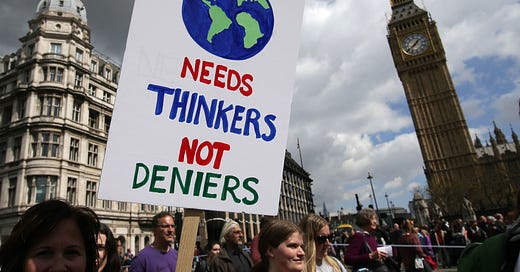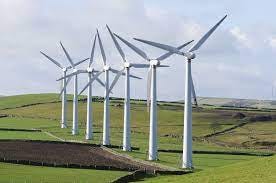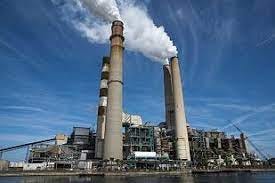Humans are putting 5 Billion metric tons of carbon into the atmosphere each year, according to NOAA (National Oceanic and Atmosphere Administration). Research into air bubbles trapped in ice indicates that carbon levels have never been this high. Is all that carbon in the atmosphere causing global warming? Most likely: yes.
So there. I am clearly not a climate change denier.
However, I do deny that the popular “solutions” to climate change making the rounds will actually help. Some of them will make the problems worse.
It seems that the universal, standard knee-jerk “solution” to any problem is to look to the government. And so, via incentives (subsidies, tax credits & deductions), special taxes, and outright mandates (enforced by law and the courts), governments everywhere are trying to get us all to reduce - or stop - burning fossil fuels.
And so they vilify the oil companies. Supposedly, their lust for bigger profits is the root cause of global warming. Government wants, among other plans, to levy a carbon tax, based on the carbon content of their product. Energy producers would, in theory, pass this cost onto consumers, who would be incentivized to use less. But trying to use the tax code for social engineering is a terrible idea. The original goal of taxation is to raise revenue, not to mold human behavior into whatever government wants us to do this time. And government already has plenty of revenue. Taxes need to be cut, not raised. Don’t give those bozos more of our hard-earned money.
The huge costs and loss of jobs, of course, is irrelevant. But that’s okay, the Progressives say, because it will create more “green” jobs in the long run. They’ve been saying for centuries that earning a profit is evil, anyway. Moreover, “green” jobs are supposedly better than “dirty” jobs that involve fossil fuels, right? The sobering fact is that government’s favored energy sources will NOT fix global warming. They may actually cause more environmental-related problems
Take wind energy. First, it only works where and when the wind blows. Windmills require vast quantities of land or sea space. When all costs are included, it is questionable if the energy produced even pays for it. Also, they kill birds. And sorry, but windmills are NOT aesthetically pleasing. And they’re noisy, to boot. And what do you do if they produce excess energy? We’ll discuss batteries shortly.
Hydro-electric power requires flooding vast quantities of land. Like wind and solar, it’s dependent on the weather (precipitation). Dams also kill fish trying to swim upstream to spawn.
Solar energy, like wind, only works if the sun shines, and again, consumes vast quantities of land. Manufacturing solar panels requires many exotic elements. And again: do you use batteries to store excess energy?
Which brings us to batteries. Much progress has been made in battery technology in the last few years, but the fundamental problems of using them for large-scale energy storage will be with us for a long time. Batteries (like solar panels) require great quantities of exotic minerals which much be mined from the earth, then transported to factories. And batteries eventually wear out, and cannot be recycled, or dumped into a landfill. Their entire life-cycle is terribly earth-unfriendly.
And that’s why electric cars are no kind of solution for global warming. If every single internal-combustion engine road vehicle in the world was replaced with an electric vehicle, it would only reduce atmospheric carbon by .0000001%.
That is mainly because, in addition to the battery problems described above, you must charge up an electric car - which brings us to the electricity grid. Here are some numbers on how electricity is generated, world-wide (as of 2017, the last year where I could find data):
Fossil: 65 %
Hydro: 16 %
Nuclear: 11 %
Wind: 4 %
Biomass (burning wood, special crops, garbage, etc.): 2 %
Solar: 1 %
Geo-thermal: ½ %
It seems that the vast bulk of the world’s electricity comes from burning fossil fuels. Fish-killing, land-destroying hydro power comes in 2nd. Wind and solar only make up only 5%. Burning biomass is a small portion, but it releases even more carbon than fossil fuels.
Hey, if you think electric cars are cool, and love driving them, then go for it and buy one! But don’t do so because of some notion that it’s saving the planet. It’s not. And please do not ask me to pay taxes to fund the government’s incentives to push them on us.
Oh and speaking of electric cars, the latest governmental sales pitch to encourage us to buy them goes like this: They can be engineered for reverse charging. Thus if the grid fails, you can plug it in and use the power in the battery to energize the grid or whatever. They are “batteries on wheels”! Now - just hold on there a minute... The primary purpose of a vehicle is transportation. If you suck the battery dry as a power substitute, you’re left with a hunk of metal in the garage that ain’t going nowhere - with no way to repower it. What exactly are you supposed to do then if you need transportation?
Furthermore, road vehicles are not the only energy-guzzling transportation modes in use. It says a lot about the mindset of the green do-gooders that they disregard ships, trains, and aircraft.
Ok so I’ve denied and debunked all these government-created “solutions” to global warming. Are there some things that could be done that truly do help? As a matter of fact: yes.
First, there are energy sources that really do work, and release either miniscule amounts of carbon, or none at all. Let’s start with nuclear, a power source that just doesn’t get enough attention. It has zero carbon emissions, and for all practical purposes, unlimited energy output. Ships, mentioned above, can be nuclear-powered, as the military has been doing successfully for over half a century. It’s high time to power commercial ships likewise. Ditto for trains.
Then there’s natural gas, an under-utilized resource. Yes it’s a fossil fuel, but its emissions are a fraction of other such fuels.
Geothermal is another zero-emission option. Deep earth-sinks with a heat pump can actually be implemented almost anywhere.
As for removing carbon from the atmosphere, the best technology ever invented is: trees! A mature tree, depending on its size and other factors, can absorb from 20 to 170 kilograms of carbon every year. Let’s plant trees, not windmills.
And regarding cars: As I’ve pontificated many times, what good does it do to cut per-vehicle emissions in half, but double the number of vehicles on the road? Government aggravates the problem with its perpetual goal of trying to pave the continent. The solution to road vehicle emissions is easy: stop “biggering” the roads! Then we’d all have real incentives to seek out cleaner, more efficient modes of transporting people and freight than private cars and cargo trucks.
Like maybe: nuclear powered trains. A high-speed fleet of them could replace a bunch of aircraft.










Fabulous, David.
Air pollution is a “commons” issue. You wouldn’t dump trash on your neighbor’s lawn (at least while he’s looking) but nobody “owns” the atmosphere.
If I’m running a coal-fired power plant I’m not going to spend the money to switch to gas or nuclear unless the government, the default “owner” of the atmosphere, either requires or incentivizes me to do so.